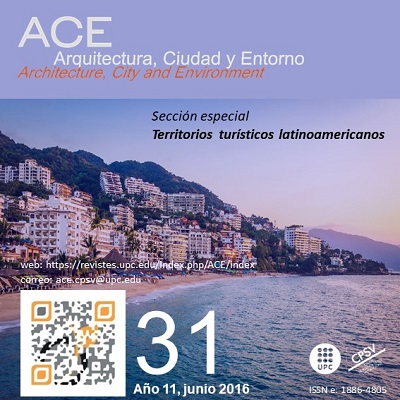Public space in current government programmes in the mexican urban context: the case of Xalapa, Veracruz
DOI:
https://doi.org/10.5821/ace.11.31.4682Keywords:
urban open space, urban improvement, urban policies, Veracruz-MexicoAbstract
The lack of official administrative capacity and resources to implement coherent urban and regional land use policies has constrained the quality of life in Mexican cities for many decades. Recently, all levels of government have promoted various public programmes for urban improvement, which consider and recognise public space as relevant for the solution of urban problems. In this way, through programmes related to public space development the administration intends to make a difference to the quality of urban life all over the country. This article approaches the multiple dimensions and meanings of urban public space and how these are reflected in public policies and programmes implemented in Mexico in the 21st century. It is important to reflect on governmental initiatives to deal with the challenges facing urban spaces in contemporary Mexico. Through a qualitative methodology, this paper firstly explores the dimensions of contemporary public space and their relation to the policies and programmes related to public space configuration in Mexico. The paper goes on to reflect on the programmes’ implementation in the context of the metropolitan area of Xalapa, Veracruz. From this analysis, a critical perspective can be taken on the adequacy and effectiveness of national public policies and their materialization in a local context. The results are related to the way public policies and programmes are assumed, interpreted and finally applied in a specific urban area.
Downloads
Published
Issue
Section
License
| INTELECTUAL PROTECTION CRITERIA |
At this moment, it is count with the "Oficina Española de Patentes y Marcas", while global protection it is being processed by the World Intelectual Property Organization (OMPI/WIPO). Nevertheless the International Standard Serial Number Office (ISSN) has given the following numbers ISSN: 1886-4805 (electronic version) and 1887-7052 (paper version). All articles will be peer reviewed, using double blind reviewing. |
| COPYRIGHT |
The article contents and their comments are authors exclusive liability, and do not reflect necessarily the journal editor commitee's opinion. All ACE published works are subject to the following licence CC BY-NC-ND 3.0 ES http://creativecommons.org/licenses/by-nc-nd/3.0/es/ It implies that authors do not hold nor retain the copyright without restrictions but only those included in the licence. |





































